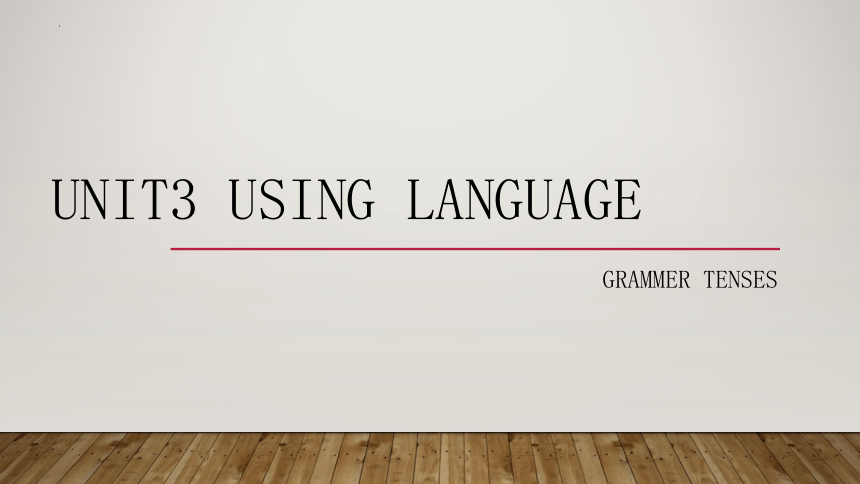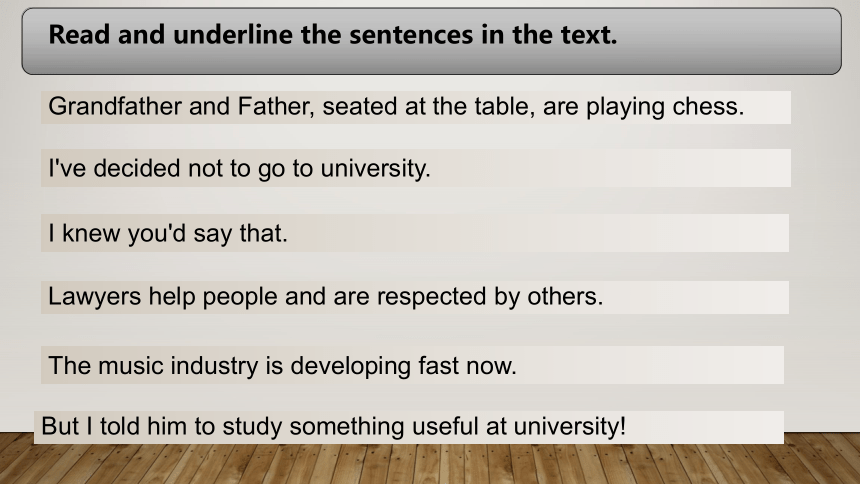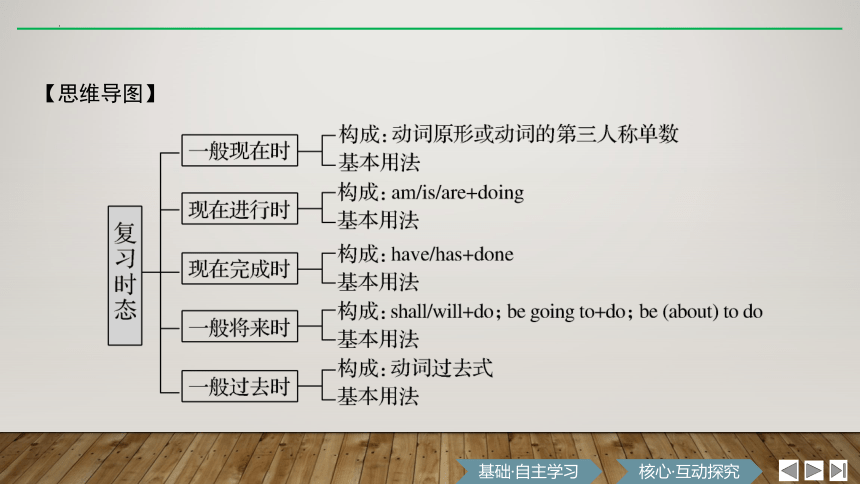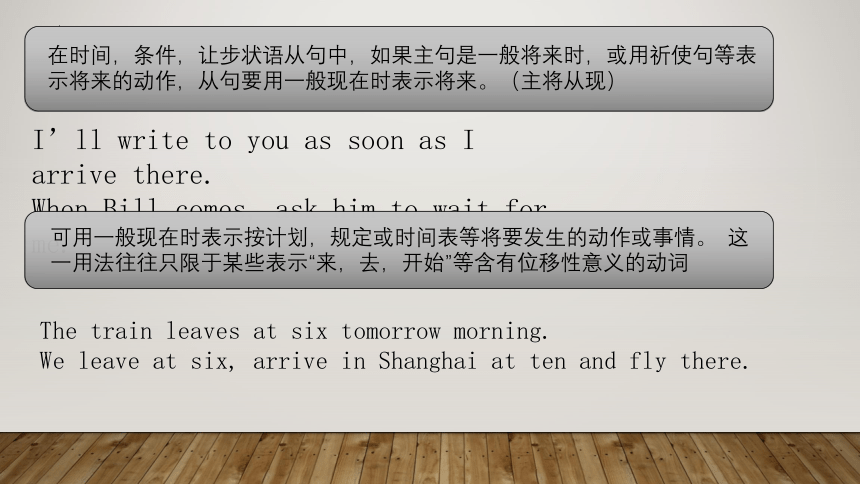外研版(2019)必修第一册Unit 3 Family matters Using language 时态课件(共18张PPT)
文档属性
| 名称 | 外研版(2019)必修第一册Unit 3 Family matters Using language 时态课件(共18张PPT) |

|
|
| 格式 | pptx | ||
| 文件大小 | 1.1MB | ||
| 资源类型 | 教案 | ||
| 版本资源 | 外研版(2019) | ||
| 科目 | 英语 | ||
| 更新时间 | 2022-11-04 00:00:00 | ||
图片预览







文档简介
(共18张PPT)
unit3 using language
grammer tenses
Tell some stories taking place in the past and in the future.
Read and underline the sentences in the text.
Grandfather and Father, seated at the table, are playing chess.
I've decided not to go to university.
I knew you'd say that.
Lawyers help people and are respected by others.
The music industry is developing fast now.
But I told him to study something useful at university!
1 Something that started
in the past and is
affecting the present.
2 Something that is
currently taking place.
3 Something that is
certain to take place
in the future.
4 Something that was
completed in the past.
5 Something that
happens regularly in
the present.
a. Grandfather and Father,
seated at the table, are
playing chess.
b. Lawyers help people and
are respected by others.
c. ...you said that you
wanted to be a
professional football player.
d. ...you have found the
career that suits your
talents.
e. ...you will have two
options for your future.
Read and match
【思维导图】
表示现在经常或反复发生的动作或存在的状态。常和often, always, usually, sometimes, every day, once a week等时间状语连用
一般现在时
He always goes to work by subway.
It often snows here.
表示客观真理或用于格言中
Light travels faster than sound.
I’ll write to you as soon as I arrive there.
When Bill comes, ask him to wait for me.
在时间,条件,让步状语从句中,如果主句是一般将来时,或用祈使句等表示将来的动作,从句要用一般现在时表示将来。(主将从现)
The train leaves at six tomorrow morning.
We leave at six, arrive in Shanghai at ten and fly there.
可用一般现在时表示按计划,规定或时间表等将要发生的动作或事情。 这一用法往往只限于某些表示“来,去,开始”等含有位移性意义的动词
We’re far from home. What are our parents doing at the moment?
Mr Cheng is visiting our village this month.
Listen! Our English teacher is singing the popular English song.
当句中有时间状语 now, at the moment等时,谓语动词要用现在进行时。
当从句中有时间状语 these day, this week, this month 等时,如果句子要表达这一阶段正在发生的事,则谓语动词用现在进行时。
当从句中出现了 look, listen, 等暗示信息时,谓语动词应用现在进行时。
现在进行时
Are you going anywhere tomorrow
现在进行时还有另外一种含义,即他们能表达即将发生的事情,相当于一般将来时。
能够用现在进行时来表示的状况的动词有:
Arrive, come ,do ,get ,go, have …
一般过去时
When was the film on
We often played basketball together when we were young.
表示过去某一时间发生的动作,存在的状态或过去反复发生的动作。
一般过去时往往和明确表示过去的时间连用,如“last +时间”,yesterday, “时间+ago”, in +过去时间,just now等。
有些动作看似是发生在说话时,但实际是指过去发生的动作或存在的状态,表示刚刚发生的事情,要用一般过去时。
Did the telephone ring
I’m sorry, I didn’t hear what you said. I was looking at the picture.
一般将来时
一般将来时表示在现在看来即将发生的动作或存在的状态。 常与 tomorrow. Soon, sometime, next year/week/month, in a few days, in the future等时间状语连用。
What will you do this afternoon
一般将来时的基本结构
Shall/will + 动词原形 (shall 一般用于第一人称,will 陈述句中用于各种人称。)
“ Am/is/are going to + 动词原形” 表示按计划或安排要发生的事情,也表示有迹象表明要发生的事情。
一般将来时的特殊结构
The plant is to die if it is not watered regularly.
You are not to talk during the exam.
“Am/is/are to + 动词原形” 结构表示按计划,约定,职责,义务或要求必须做的事,或即将发生的动作,也可表示意见。
I was about to go out when the phone rang.
Don’t leave. Li Lei is about to come.
“Am/is/are about to do sth” 或“am/is/are on the point of doing sth” 结构意为”马上要做某事”, 通常不与明确将来的时间状语连用,常用于句型 be about to do sth/ be going to do sth, when… 意为“正要做某事,这时、突然……”
其他时态代替一般将来时的情况
The schoolmaster is leaving the village, and everybody seems sad.
Come, go, leave, arrive, begin, start, stop, close, open, die 等瞬间动词常用现在进行时表示将来。
Once the tree falls, the monkeys on it will flee helter-skelter. 树倒猢狲散
The car will find its way round the hill when it gets there. 车到山前必有路
Until you make peace with who you are, you’ll never be content with what you have.
由 unless, before, once ,when, until, if, wherever 等引导的状语从句中常用一般现在时表将来。
现在完成时
I have never seen such a kind man before.
I have already made great progress in English with help of the book.
表示过去发生的动作或存在的状态对现在造成了影响,常与 yet , already, before, ever, never等连用。
表示过去发生的动作或存在的状态一直持续到现在,并有可能延续下去,常与“for + 时间段”,“since+ (表示过去的时间点)”, so far, up to now, lately, in /during/over the past few years, ever since 等时间状语连用。
So far the well-known journalist has accumulated more than 4000 interviews with famous people.
Owing to a speedup in urbanization and improvement in living standards, people’s consumption patterns have changed in the last few years.
常用于现在完成时的固定句型
It/ That / This is / will be the first / second/ third/ …time (that) 从句, 句型中,从句要用现在完成时。
This is the + 形容词最高级 + 名词 + (that)从句, 句型中,从句要用现在完成时。
“主语+ 现在完成时+ since” 引导的时间状语从句(从句用一般过去时),也可作” It is/ has been + 时间段+ since” 。
It is the first time in more than thirty years as a civil servant that Coleman has heard such words.
This is the best gift that I have received.
I have admired her since I met her last time.
现在完成时和一般过去时辨析
He once lived in London for many years, but he was never regrated his final decision to move back to China.
现在完成时和一般过去时都能表示过去发生的动作,但现在完成时表示过去的动作对现在的影响,并且表示这一动作已完成或可能继续下去。
Thanks!
unit3 using language
grammer tenses
Tell some stories taking place in the past and in the future.
Read and underline the sentences in the text.
Grandfather and Father, seated at the table, are playing chess.
I've decided not to go to university.
I knew you'd say that.
Lawyers help people and are respected by others.
The music industry is developing fast now.
But I told him to study something useful at university!
1 Something that started
in the past and is
affecting the present.
2 Something that is
currently taking place.
3 Something that is
certain to take place
in the future.
4 Something that was
completed in the past.
5 Something that
happens regularly in
the present.
a. Grandfather and Father,
seated at the table, are
playing chess.
b. Lawyers help people and
are respected by others.
c. ...you said that you
wanted to be a
professional football player.
d. ...you have found the
career that suits your
talents.
e. ...you will have two
options for your future.
Read and match
【思维导图】
表示现在经常或反复发生的动作或存在的状态。常和often, always, usually, sometimes, every day, once a week等时间状语连用
一般现在时
He always goes to work by subway.
It often snows here.
表示客观真理或用于格言中
Light travels faster than sound.
I’ll write to you as soon as I arrive there.
When Bill comes, ask him to wait for me.
在时间,条件,让步状语从句中,如果主句是一般将来时,或用祈使句等表示将来的动作,从句要用一般现在时表示将来。(主将从现)
The train leaves at six tomorrow morning.
We leave at six, arrive in Shanghai at ten and fly there.
可用一般现在时表示按计划,规定或时间表等将要发生的动作或事情。 这一用法往往只限于某些表示“来,去,开始”等含有位移性意义的动词
We’re far from home. What are our parents doing at the moment?
Mr Cheng is visiting our village this month.
Listen! Our English teacher is singing the popular English song.
当句中有时间状语 now, at the moment等时,谓语动词要用现在进行时。
当从句中有时间状语 these day, this week, this month 等时,如果句子要表达这一阶段正在发生的事,则谓语动词用现在进行时。
当从句中出现了 look, listen, 等暗示信息时,谓语动词应用现在进行时。
现在进行时
Are you going anywhere tomorrow
现在进行时还有另外一种含义,即他们能表达即将发生的事情,相当于一般将来时。
能够用现在进行时来表示的状况的动词有:
Arrive, come ,do ,get ,go, have …
一般过去时
When was the film on
We often played basketball together when we were young.
表示过去某一时间发生的动作,存在的状态或过去反复发生的动作。
一般过去时往往和明确表示过去的时间连用,如“last +时间”,yesterday, “时间+ago”, in +过去时间,just now等。
有些动作看似是发生在说话时,但实际是指过去发生的动作或存在的状态,表示刚刚发生的事情,要用一般过去时。
Did the telephone ring
I’m sorry, I didn’t hear what you said. I was looking at the picture.
一般将来时
一般将来时表示在现在看来即将发生的动作或存在的状态。 常与 tomorrow. Soon, sometime, next year/week/month, in a few days, in the future等时间状语连用。
What will you do this afternoon
一般将来时的基本结构
Shall/will + 动词原形 (shall 一般用于第一人称,will 陈述句中用于各种人称。)
“ Am/is/are going to + 动词原形” 表示按计划或安排要发生的事情,也表示有迹象表明要发生的事情。
一般将来时的特殊结构
The plant is to die if it is not watered regularly.
You are not to talk during the exam.
“Am/is/are to + 动词原形” 结构表示按计划,约定,职责,义务或要求必须做的事,或即将发生的动作,也可表示意见。
I was about to go out when the phone rang.
Don’t leave. Li Lei is about to come.
“Am/is/are about to do sth” 或“am/is/are on the point of doing sth” 结构意为”马上要做某事”, 通常不与明确将来的时间状语连用,常用于句型 be about to do sth/ be going to do sth, when… 意为“正要做某事,这时、突然……”
其他时态代替一般将来时的情况
The schoolmaster is leaving the village, and everybody seems sad.
Come, go, leave, arrive, begin, start, stop, close, open, die 等瞬间动词常用现在进行时表示将来。
Once the tree falls, the monkeys on it will flee helter-skelter. 树倒猢狲散
The car will find its way round the hill when it gets there. 车到山前必有路
Until you make peace with who you are, you’ll never be content with what you have.
由 unless, before, once ,when, until, if, wherever 等引导的状语从句中常用一般现在时表将来。
现在完成时
I have never seen such a kind man before.
I have already made great progress in English with help of the book.
表示过去发生的动作或存在的状态对现在造成了影响,常与 yet , already, before, ever, never等连用。
表示过去发生的动作或存在的状态一直持续到现在,并有可能延续下去,常与“for + 时间段”,“since+ (表示过去的时间点)”, so far, up to now, lately, in /during/over the past few years, ever since 等时间状语连用。
So far the well-known journalist has accumulated more than 4000 interviews with famous people.
Owing to a speedup in urbanization and improvement in living standards, people’s consumption patterns have changed in the last few years.
常用于现在完成时的固定句型
It/ That / This is / will be the first / second/ third/ …time (that) 从句, 句型中,从句要用现在完成时。
This is the + 形容词最高级 + 名词 + (that)从句, 句型中,从句要用现在完成时。
“主语+ 现在完成时+ since” 引导的时间状语从句(从句用一般过去时),也可作” It is/ has been + 时间段+ since” 。
It is the first time in more than thirty years as a civil servant that Coleman has heard such words.
This is the best gift that I have received.
I have admired her since I met her last time.
现在完成时和一般过去时辨析
He once lived in London for many years, but he was never regrated his final decision to move back to China.
现在完成时和一般过去时都能表示过去发生的动作,但现在完成时表示过去的动作对现在的影响,并且表示这一动作已完成或可能继续下去。
Thanks!
